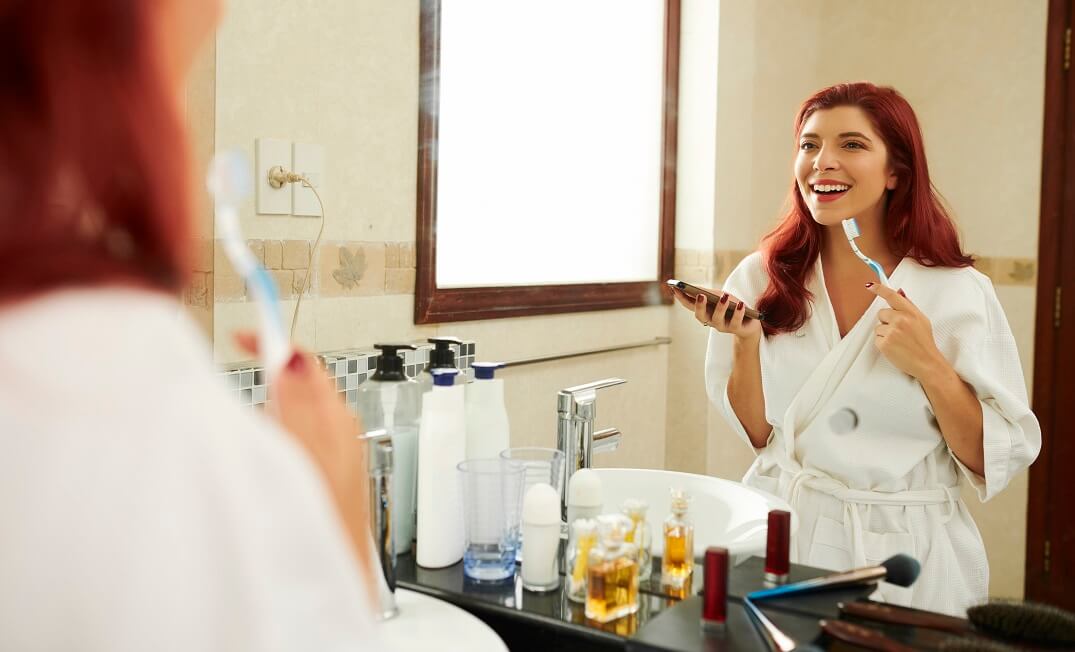For those who have lost teeth, oral surgery and dental implants provide a permanent solution that offers a natural look, feel, and function, giving you back your beautiful smile. However, cleaning and caring for your new implants is essential in order to maintain their appearance and functionality. At Soundview Family Dental, we know the importance of good implant care when it comes to keeping your new smile. These tips will help better explain regular dental implant care and maintenance, as well as lifestyle changes that can help maintain your implants and reduce the risk of implant failure.
Key Takeaways
- For single implants, brush twice a day with a soft nylon-coated brush and use low-abrasive toothpaste.
- Brush around and under the implant crowns, and floss daily with crown and bridge floss or a water flosser.
- Follow single implant care instructions for all-on-4 implants, use a sulcus brush, and use water floss with rubber tip stimulators.
- For overdentures, use a denture brush with denture cleaner or dish soap, soak dentures daily, and check for missing or damaged parts.
For single implants
Single implants are used to replace one missing tooth. They have a single titanium post with an attached dental crown. With single implants, it is important to clean around the gumline of the implant and between neighboring teeth.
Brush twice a day with a soft nylon-coated brush.
When you have dental implants, it may be necessary to change your regular toothbrush. Soft bristle toothbrushes are gentler on the implants and your gums but still as effective in removing bacteria, tartar, plaque, and food debris. In addition, electric soft-bristle toothbrushes can be more effective in removing bacteria.
Brushing twice a day is essential. Brushing in the morning helps remove the bacterial buildup that occurs while you sleep. Brushing at night removes the bacteria and food debris that builds throughout the day and reduces the risk of increased buildup overnight.
Use low-abrasive toothpaste.
Some types of toothpaste on the market can be too abrasive for your dental implant. Toothpaste containing baking soda or whitening toothpaste can damage your new implant. Look for toothpaste that is specifically made for dental implants, crowns, or sensitive teeth.
Brush around and under the implant crowns.
With single implants, cleaning around the implant crown is important as bacteria and plaque can accumulate in this area and can increase your risk of implant failure. While a traditional toothbrush can be enough, consider adding an interdental brush with a slim head to your oral hygiene routine. This brush enables you to better clean around the base of your implant and is especially beneficial for implants in the back of the mouth.
Floss daily.
Flossing is still a vital part of oral hygiene, even with an implant. In fact, flossing can make it easier to clean under and around your dental implant. Crown and bridge floss is a still floss designed to clean around your crown. Another alternative to traditional floss is a water flosser. These high-powered water jets help remove bacteria you may not otherwise be able to reach.
For all-on-4 implants
All-on-4 implants are for those missing all or most of their teeth on a single arch. In many cases, these are a permanent solution for individuals tired of dealing with dentures. All-on-4 implants use four implant posts to connect a full arch of replacement teeth. While caring for all-on-4 implants is similar to a single implant, there are some things to consider.
Follow single implant care instructions.
In general, you want to follow the same daily care instructions we provided above when caring for your all-on-4 implants. Daily brushing with a soft-bristle toothbrush and flossing is essential to reduce bacteria and keep your gums and supporting tissue healthy.
Use a sulcus brush.
With all-on-4 implants, your main target for bacterial removal is the area where your bridge meets your gumline. While a standard toothbrush can be effective, a sulcus brush is narrower. It can better address the area between your bridge and soft gum tissue, making it easier to remove bacteria and food debris.
Use water floss with rubber tip stimulators.
Oftentimes, food particles can become trapped between the bridge and your gumline. Water flossers can be a great tool to help remove debris. Look for a water flosser that comes with rubber-tipped stimulator attachments. These stimulators help remove trapped food and should become a daily part of your oral hygiene routine.
For overdentures
Overdentures are similar to all-on-4 implants. The difference is they can be removed. In most cases, they are used to replace traditional lower dentures, giving the wearer added stability. They require slightly different care and maintenance than standard implants.
Use a denture brush.
You want to use a denture brush to clean your overdentures at least once per day. This specialized brush typically has two sides. One side is a soft-bristled brush, similar to a traditional toothbrush designed for flat surfaces. The other side has a smaller head with tapered bristles designed to access hard-to-reach and uneven surfaces. When using a denture brush, do not use traditional toothpaste as it is too abrasive. Use dish soap or denture cleaner when brushing your overdentures.
Soak dentures daily.
At night, remove your overdentures as directed and let them soak overnight in a denture cleaning solution. Before replacing your overdenture in place in the morning, thoroughly rinse the overdenture in cool water to remove the cleaning solution and any loose particles that may be present.
Check for missing or damaged parts.
Overdentures contain o-rings, locator caps, and clips in order to attach to the implants. You must inspect these daily, making sure they are all in place and in good condition. If you notice any damage or missing pieces, contact your dentist immediately. In most cases, you should plan to replace the o-rings and locator caps yearly in order to maintain your overdentures.
General ways to take care of dental implants
In addition to following a good daily oral hygiene routine, there are other things you can for dental implant care and maintenance to ensure you maintain your beautiful smile. This can include:
- Avoid hard foods or chewing on items: While implants are made to be strong, chewing on hard foods, such as ice cubes or hard candy, can cause breaks or cracks. This is also true if you chew on items such as pencils or pens.
- Avoid hot water: This is especially true for those with overdentures. Soaking your overdentures in hot water can warp the denture, making it difficult or impossible to put back into place.
- Talk to your dentist about teeth grinding: If you have been told you have bruxism or grind your teeth, you need to talk with your dentist about possible treatment options. Regular teeth grinding puts excess pressure on your implants and can lead to implant failure.
- Quit smoking: You know smoking is bad for your health, but it is also bad for your gums. Smoking can cause gum inflammation, which can weaken the gums and lead to implant failure.
- Attend regular dental checkups: While dental implants replace natural teeth, that doesn’t mean you are done with dental visits, such as cleanings. Regular dental cleanings and checkups allow the dentist to monitor your implant health and help remove the bacterial buildup you may be missing.
Dental implant care is very similar to caring for your natural teeth and is just as important in order to ensure you maintain your new, beautiful smile. If you have any questions about implants or implant care, contact Dr. Eric Kitts at Soundview Family Dental online or call the office today at (425) 563-6360.


